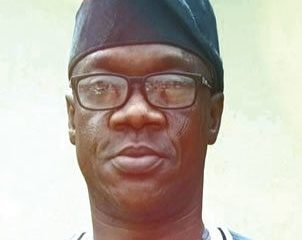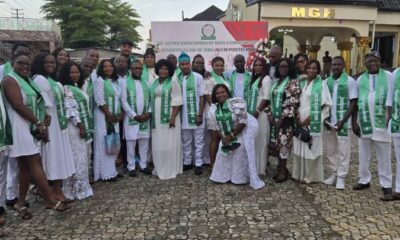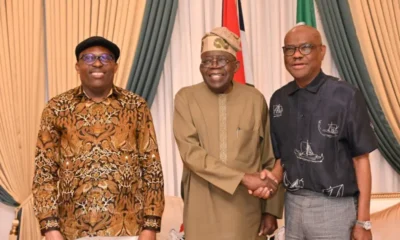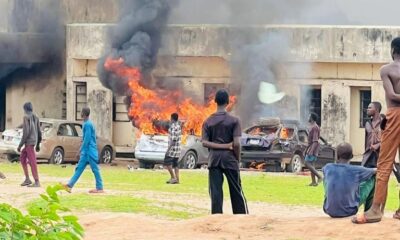News
OPINION: The Scandals In Abuja
Published
1 year agoon
By
Editor
Some cabinet members went to Western Region premier, Samuel Ladoke Akintola, to complain about the corruption of one of their colleagues. They said the man was stealing their party’s funds and eating government money with reckless abandon. They said the gentleman’s impunity knew neither the fear of the law, nor of the party and the people. “He is even building two houses at the same time,” they rammed it in. Chief Akintola listened attentively to the complainants and their complaints. He then turned to the accused who was also seated right there.
“You heard that? They said you are building two houses at the same time; you are building one in Oyo; you are building another in Ibadan. You are the party’s treasurer; you are also in charge of the government’s finances. Can’t houses be built one after the other? (Ngbó, wón ní ò nkó’le méjì léèkan soso; ìkan l’Òyó, ìkan n’Bàdàn? Ìwo ni treasurer egbé; ìwo náà ni minister owó. Sé ilé ò seé kó ní’kòòkan ni?).» If that line of adjudication was strange to the complaint lodgers, Chief Akintola was still not done with them. He had some words for the accusers.
“Each of you is in charge of a ministry of government. If we flash a torch into your anus, won’t we see faeces?” He asked, looking straight into their eyes. They looked down. Then Akintola faced the leader of the accusers. “And you, but I know that you have just built a house in Ibadan for one of your mistresses (Ìwo, mo sebí o sèsè kó’lé fún àlè re kan n’Bàdàn ni). The accusers were shocked by their leader’s bent of justice. But they ought not to be shocked. The leader once said publicly that he was a master of equivocation. The premier didn’t release his guests without a warning to both sides to be sensitive to public sensibilities in their use of public funds.
Dr Omololu Olunloyo, a second republic governor of the old Oyo State, will be 89 years old this year. He once told me the significance of this year in his life but I am not permitted to say it – at least, not now. Where I come from, a man does not tell all he is told. Olunloyo also knows too much, perhaps that explains his ‹refusal’ to write his autobiography despite our prodding and pressure. But he told me stories, one of which is the Akintola story I just told above – although I have hidden the names of the accused and the accusers. I will tell yet another one from that former governor, especially now that the Federal Republic of Nigeria is enmeshed in an argument over whether or not it is permitted and legal in public service to officially move public money into private accounts.
FROM THE AUTHOR: OPINION: Pastor Adeboye And King-size Destinies
Olunloyo was very close to Akintola. He was also very close to Prime Minister Abubakar Tafawa Balewa. One day, Balewa drew Olunloyo aside and told him his story of helplessness: “Doctor Olunloyo, this country is a country of thieves. As I sit here, my appointees managing the central bank are stealing money. If I move my seat from here to the CBN, right under my nose and supervision there, they will still steal money. Look, I just caught a thief, but they said I can’t prosecute him because of where he comes from – unless I catch at least one thief each from the other regions.”
If Vulture claims that it is not today that the rains started beating him, you think he is lying. Please, believe Vulture. The two cases above occurred in the early 1960s – that was some sixty-something years ago. And it wasn’t only the political class that was implicated. Even the wretched of the earth believe in fish eating fish to get fat.
In 1952/1953, seven years before independence, there was a commission of inquiry into the administration of Lagos Town Council. The commission found that «in hospitals, nurses require a fee from every in-patient before the prescribed medicine is given, and even the ward servants must have their ‹dash’ before bringing the bed-pan; it is known to be rife in the Police Motor Traffic Unit, which has unrivalled opportunities on account of the common practice of overloading vehicles; pay clerks make a deduction from the wages of daily paid staff; produce examiners exact a fee from the produce buyer for every bag that is graded and sealed; domestic servants pay a proportion of their wages to the senior of them, besides often having paid a lump sum to buy the job.» Can you see the class of those implicated in those findings? Ordinary workers. Public and private sector workers still do it; politicians do it; they buy and sell positions. Indeed, our political situation has always been like eighteenth century England when «it was taken for granted that the purpose for going into parliament or holding any public office was to make or repair a man’s personal fortune» (R. M. Jackson, 1958, page 345).
FROM THE AUTHOR: OPINION: The Judicial Adultery In Kano
Above, you read about people buying public and private jobs in 1952/1953 Lagos. You would think 60 years of independence should be long enough for a people’s redemption to occur. But jobs are still being purchased in Nigeria of 2024. If anything has changed in our story over the last six decades, it is that the acorn of misdeeds of the past has grown to become an oak. The oak is that behemoth no one wraps their arms around to climb. The oak is igi osè in my part of the world. If you are Yoruba, you should be familiar with this incantation: Wón d’òyì k’ápá, apá ò k’ápá; wón d’òyì k’ósè apá ò k’ósè…). That is what corruption has become. The law is helpless before the powerful because no sane person looks into a deep well and jumps into it. It is our major gain in sixty years of flag independence. Our country is fully vaccinated against all virtues. Follow the variegated stories around Emefiele. Instead of retail stealing in the central bank, the CBN itself has been stolen – what we have there is ‹kòròfo ìsáná› – a matchbox without matchsticks. Follow other recent scandals in Abuja. Instead of government ministers being content with stealing their ministries’ money «to build two houses simultaneously,» they are stealing the ministries. Yet, nothing happens to the plunderers because they are like human eyes – they come with divine immunity from intrusive fingers – Àánú ojú kìí jé kí wón t’owó b’ojú. They are also like rattle snakes –Ìbèrù ejò kìí jé kí wón te ejò mó’lè. Another incantation!
You saw a document that surfaced some days ago signed by the Minister of Humanitarian Affairs and Poverty Alleviation, Dr Betta Edu. In that memo, Edu directed the Accountant General of the Federation to transfer the sum of N585,198,500.00 into a private account belonging to one Oniyelu Bridget. There was a national uproar. If you were part of the outrage, it means you no get job. Did you not see that the minister did not disown the document? With her full chest, she owned it and declared what she did as legal. She also did not forget to blame the leakage and the outrage on her enemies. She called them desperate persons implicated in an earlier scandal of N44.8bn in the National Social Investment Programme Agency (NSIPA). She said they wanted to «stain her integrity because she alerted the government on the ongoing N44.8 Billion fraud in NSIPA…» She was referring to the scandal that has led to the suspension of the National Coordinator and chief executive of the NSIPA, Mrs Halima Shehu, by President Bola Tinubu. There are reports that Halima moved that amount (N44.8 Billion) into some unusual accounts. We do not have the details. And, we have not heard her own defence direct from her mouth. But her own people plead her innocence; they are accusing her enemies of being behind her ordeal.
Then the Accountant General of the Federation (AGF), Dr Oluwatoyin Madein, weighed in on Saturday. She said although her office received the said request from Edu, it ignored it. She said she did not make the payment as instructed because the procedure was wrong.
FROM THE AUTHOR: OPINION: Powerful Lagos, Powerless Osun State
The engine of Nigeria’s bureaucracy has broken down. The Yoruba would say if the short one is not wise, what about the tall one? Were civil servants in Edu’s ministry who presumably drafted the memo for her to sign not aware of the existence of the laws guiding the processing, movement and use of public funds? There is Nigeria’s Financial Regulations 2009. Its Chapter Seven, Section 713 states that “personal money shall in no circumstances be paid into a government bank account, nor shall any public money be paid into a private account.» If the civil servants didn’t know the law, you would think the person signing that half-a-billion naira memo would pause and check. Was there not a retreat shortly after the ministers were appointed? What were they taught at those opulent sessions?
Things are happening. We only know what our husbands allow us to know or what ‹accidentally’ leaks like the N44.8 billion suspension and the N585 million memo. The present Federal Government with its three branches is particularly audacious in doing the unthinkable. The unthinkable is what you calmly do when you know you’ve conquered the world.
We can dismiss all these and say they do not matter, that after all, no money is lost (yet). But that deadly, slithering being called snake has a way of climbing its way to the top of the raffia palm. Ninety-two-year-old British political scientist, Colin Leys, in 1965 wrote on the consequences of corruption, impunity and sleaze on the future of Africa. Writing in his ‹What is the Problem about Corruption?’ Leys argued that «If the top political elite of a country consumes its time and energy in trying to get rich by corrupt means, it is not likely that the (country’s) development plans will be fulfilled.» His prediction reeked of doom. About that time, Ronald Wraith and Edgar Simpkins published their book, ‹Corruption in Developing Countries’ (1963). They looked into practices in African countries, including Nigeria. They said they saw a «jungle of nepotism and temptation… a dangerous and tragic situation.» They described the landscape as «the scarlet thread of bribery and corruption.» They witnessed malfeasance flourishing «as luxuriantly as the bush and weeds which it so much resembles.» They saw the toxins of corruption «taking the goodness from the soil and suffocating the growth of plants which have been carefully and expensively bred and tended.» I suggest you read that metaphor of gloom again. If nothing fruitful grows today, it is because the earth was scorched yesterday.
The vaccine that will cure our political elite of greed has not been made. Lanrewaju Adepoju, a Yoruba performing poet who died recently, looked at a situation like this in the 1980s and declared that nothing overwhelmed a babaláwo more than being confronted with a bad case that permitted no remedial ritual. The Nigerian situation is pretty much like a terminal illness – or worse, like a carcass being mobbed by a pack of wolves and a wake of vultures. Everyone tears at it, exacting their share. And the predators are very bold and daring. Socialists and Marxists will blame this tragedy on the greed of capitalism and its lack of shame. English trade unionist, Thomas Dunning (1799-1873), quoted by Karl Marx in his three-volume work ‹Capital’ said «With adequate profit, capital is very bold. A certain 10 percent will ensure its employment anywhere; 20 percent certain will produce eagerness; 50 percent, positive audacity; 100 percent will make it ready to trample on all human laws; 300 percent, and there is not a crime at which it will scruple, nor a risk it will not run, even to the chance of its owner being hanged. If turbulence and strife will bring a profit, it will freely encourage both…” Just sit back and, like Akintola, take a long look at the accused and the accusers in the current scandal in Abuja. Look at the entire business architecture of government. Corruption is the only business that yields returns here. In 60 years plus, the Nigerian state has established itself as a crime scene. We all know that things can’t continue like this without the world coming to an end. But the questions are: Where is the face of the saviour? And who really is clean?
You may like
News
NYSC Commends Bauchi Govt On Infrastructural Development In Orientation Camp
Published
5 hours agoon
July 1, 2025By
Editor
The National Youth Service Corps (NYSC) has commended Gov. Bala Mohammed of Bauchi state on his infrastructural development projects in NYSC permanent orientation camp in the state.
Mr Umoren Kufre, the NYSC Coordinator in the state made the commendation on Tuesday during the closing ceremony of the 2025 Batch ‘A’ stream II orientation course on Wailo, Ganjuwa Local Government Area of the state.
According to him, the renovation of corps members’ hostels and camp officials’ blocks as well as the construction of a brand new multipurpose hall in the camp by the state government portrayed the governor as a good father of the youth.
“This kind gesture will remain very fresh in our minds for a long time to come. Once more, thank you, your Excellency.
READ ALSO: NYSC Urges Bauchi Governor To Reconstruct Collapsed Camp Fence
“I also wish to thank the Bauchi state Government for providing the conducive environment and security for both Corps members and camp officials which contributed in no small measure in making this exercise a huge success
“Similarly, I appreciate all of our collaborating agencies that sent their personnel to assist us in the running of the camp. My staff, as usual, were at their very best to ensure a seamless exercise. May God bless and reward you all
“I wish to register our appreciation to the Wailo Community for being our good host and neighbours over the years, their efforts in meeting our needed casual labour demands eased much stress on the Corps members and officials
“In the same spirit, I sincerely like to commend the patriotism, loyalty, patience, perseverance, understanding, and the good conduct of Corps members during the orientation course,” he said.
READ ALSO: NYSC Assures Impactful Participation Of Corps Members On Host Communities
Kufre enjoined the corps members to continue to be obedient, loyal and diligent, urging them to endeavour to settle down quickly in their places of primary assignment and adapt to the ways of life there.
He further called on them to do their best in obeying the rules governing their host communities, learn to appreciate their customs and culture and ensure that they leave the places better than they meet them.
“The people of Bauchi state, as you have been told many times, are hospitable people and the glaring proof as you can see are the buses sent by Local Government Councils to convey you to your places of primary assignment.
“I implore you to reciprocate this good gesture by contributing your best to the upliftment of your host communities and Bauchi State in general,” said the Coordinator.
1,300 corps members completed the orientation course and were posted to different parts of Bauchi state for the one year compulsory service.
News
Ghana Deports Convicted Nigerian For Smuggling Fake $100,000
Published
6 hours agoon
July 1, 2025By
Editor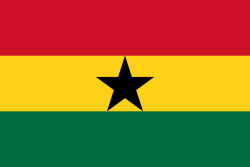
A Nigerian, Aremu Adegboyega, convicted by a Circuit Court in Accra, Ghana, for smuggling counterfeit CFA francs worth over $100,000 into the country through an unauthorised border route will be deported to Nigeria, according to The PUNCH.
Justice Christiana Cann, who presided over the case ordered his immediate deportation by the Ghana Immigration Service.
According to ASP Isaac Anquandah, as cited by a Ghanaian news outlet, The Chronicle, on Monday, Adegboyega was arrested in 2023 by customs officers stationed at the Aflao border while he was travelling on a motorcycle.
The 55-year-old was charged with two counts of possessing forged notes, in violation of Section 18(2) of Ghana’s Currency Act, 1964 (Act 242), as well as one count of illegal entry into the country.
READ ALSO:Ghanaians Protest, Decry ‘State-sponsored’ Harassment In Abuja
For possession of counterfeit CFA francs, the court fined the convict 250 penalty units, equivalent to GH¢3,000.
In default of payment, according to the report, he will serve a two-year prison sentence with hard labour.
For illegal entry into Ghana, he was reportedly fined an additional 120 penalty units or GH¢1,440. If he fails to pay, The Chronicle reports, he will serve another two-year prison term.
The sentences are expected to run concurrently, meaning he will serve a maximum of two years if he defaults on both payments.
READ ALSO:Ghana’s Ex-security Chief Charged With Theft, Money Laundering
The report added that, in addition to the fines and prison sentence, the court ordered his immediate deportation to Nigeria.
Adegboyega was apprehended at Beat Zero, an unauthorised crossing point along the Ghana-Togo border.
Riding as a pillion passenger on a motorcycle and carrying a backpack, according to the police, he aroused suspicion, prompting the officers to search his belongings.
During the search, officers discovered bundles of suspected counterfeit currency: CFA francs totalling CFA 80,653,000 and Nigerian naira amounting to N101,500.
READ ALSO:US Deports Six Nigerians For Various Offences
Further investigation revealed that he had smuggled the fake currency into Ghana from Togo.
According to the police, he admitted in a caution statement that he was aware the money was counterfeit.
He also confessed to receiving the forged notes from a man identified as Alhaji Saibu in Nigeria, under the instruction of an alleged mafia figure named Alhaji Dials, believed to be based in Abidjan, Côte d’Ivoire.
Adegboyega joins another Nigerian, Abu Arome, who is currently standing trial alongside three Ghanaians for alleged fraud.
A statement issued on Friday by the Force Public Relations Officer, Muyiwa Adejobi, disclosed the suspects were accused of committing the crime using forged documents, falsified signatures, and fraudulent claims.
News
CAC Unveils AI-powered Portal For 30-minute Company Registrations
Published
10 hours agoon
July 1, 2025By
Editor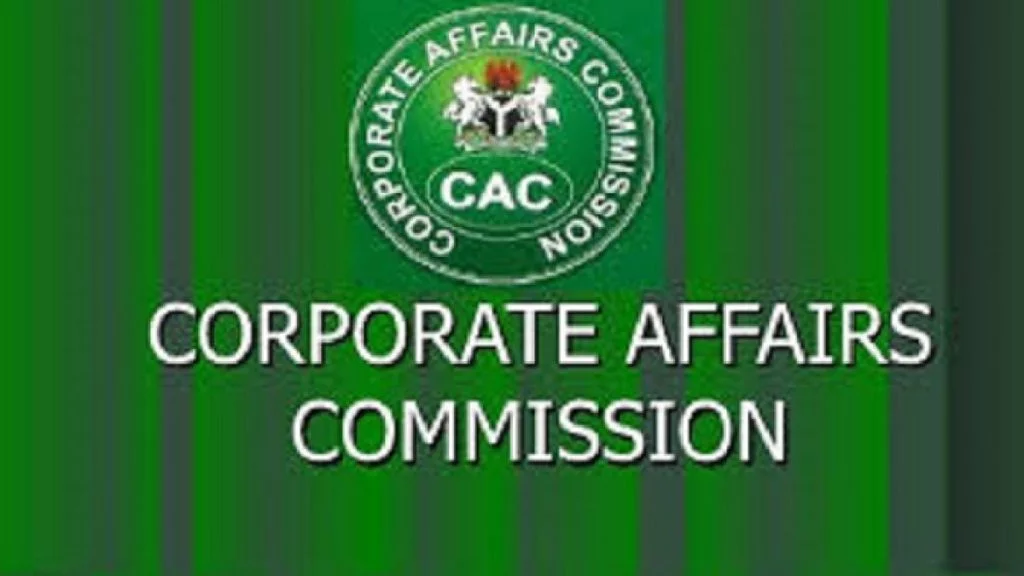
The Corporate Affairs Commission has launched a pilot Artificial Intelligence-powered registration portal to overhaul the current Company Registration Portal.
The Registrar-General and Chief Executive Officer of the Commission, Hussaini Ishaq Magaji, disclosed this at the 2025 Stakeholders’ Forum meeting.
A statement issued by the commission on Tuesday described the initiative as a game-changer aimed at significantly reducing registration timelines and enhancing the ease of doing business across the country.
According to Magaji, the new system allows for instant name reservation approvals, likening the process to opening an email account.
READ ALSO:
“It is intelligently designed to suggest available alternatives and grant real-time approvals, removing the traditional bottlenecks,” he said.
One of the portal’s standout features is its ability to facilitate business registration using only the National Identification Number of a director or proprietor.
Magaji said that once real-time NIN verification is successful, a certificate of incorporation would be generated and delivered to the applicant’s email within 30 minutes.
He stated, “The target time for business registration is under 30 minutes to generate a certificate and deliver to the customer’s email, subject to real-time NIN verification.”
READ ALSO:CAC’s Good Women Choir Leader, Fasoyin, Speaks On Composition Of ‘Odun Nlo Sopin’ Song
While acknowledging that some delays may still arise due to external validations from the National Identity Management Commission, he revealed that a contingency plan has been built into the platform, using AI-powered photo ID matching to overcome such hitches.
In addition, the Commission plans to introduce a two-factor authentication system with OTP verification for all transactions.
This, according to him, will ensure no changes can be made to company records without the explicit knowledge and consent of the registered directors.
Magaji further announced that a CAC mobile application would be launched in the final quarter of 2025 to allow users to track and manage transactions on the go.
READ ALSO:JUST IN: CAC Gives Unregistered Businesses Deadline, Warns Of Jail Term
Speaking on new partnerships, he disclosed that the Commission is currently reviewing over 100 requests from local and international super agents, including the Nigerian Inter-Bank Settlement System, aimed at deepening access and streamlining services.
Meanwhile, the Registrar-General also revealed that the Commission would commence a review of its service fees effective August 1, 2025, citing the need to maintain service quality and implement ongoing reforms.
The statement added that goodwill messages at the forum were delivered by the Chairman, Nigerian Bar Association, Port Harcourt Branch, Cordelia U. Eke; Chairman, Institute of Chartered Secretaries and Administrators, Sir Sebastian Essien; and Chairman, Nigerian Association of Small and Medium Enterprises, Elder Dogala Sakpege.
Also in attendance were Mechi Brown, Director of Industry at the Rivers State Ministry of Commerce and Industry, and Miema Akpa, who represented the Chairman of the Institute of Chartered Accountants of Nigeria, Port Harcourt branch.
A CAC technical team was present during the event to attend to customer complaints and provide on-the-spot solutions to registration challenges.
- NYSC Commends Bauchi Govt On Infrastructural Development In Orientation Camp
- Gunmen Kill 10 In Anambra Community
- EFCC Arrests 31 Suspected Internet Fraudsters In Nasarawa
- 30-year-old Man Hacks Mother To Death
- FCT Police Arrest Three Wanted Kidnappers
- Ghana Deports Convicted Nigerian For Smuggling Fake $100,000
- Man Jailed Seven Years For N11.4m Enugu Land Fraud
- Tragedy As 23-year-old Dies By Self-stabbing In Delta
- Police Raid Criminal Hideouts In Delta, Arrest Suspects, Seize Weapons
- Sex Worker Dies After Dispute Over N15,000 Refund In Ondo
About Us
Trending

 News5 days ago
News5 days agoArson: Man To Pay N150m For Burning FRSC Patrol Vehicle In Bauchi

 Politics4 days ago
Politics4 days agoBREAKING: Confusion As APC Chair, Ganduje Resigns

 News2 days ago
News2 days agoAuchi Poly Mass Comm Class of 2006 Holds Maiden Reunion in Benin

 Politics5 days ago
Politics5 days ago‘Peace Has Returned To Rivers’ — Wike, Fubara Speak After Meeting Tinubu

 Headline2 days ago
Headline2 days ago‘They Checked My Instagram’ – Nigerian Lady Breaks Down After Landing In U.S, Denied Entry

 Metro2 days ago
Metro2 days agoBREAKING: Emir’s Palace, NDLEA Office Set Ablaze As Protest Rocks Kwara

 Sports4 days ago
Sports4 days agoChelsea Set To Offload Jackson, Madueke, 8 Others [See list]

 News3 days ago
News3 days agoNSCDC, Immigration, Others: FG Postpones Recruitment, Changes Portal

 Metro4 days ago
Metro4 days agoNAPTIP Declares Speed Darlington Wanted For Tape, Cyberbullying

 Metro1 day ago
Metro1 day agoPanic As Bees Invade Central Mosque In Edo
